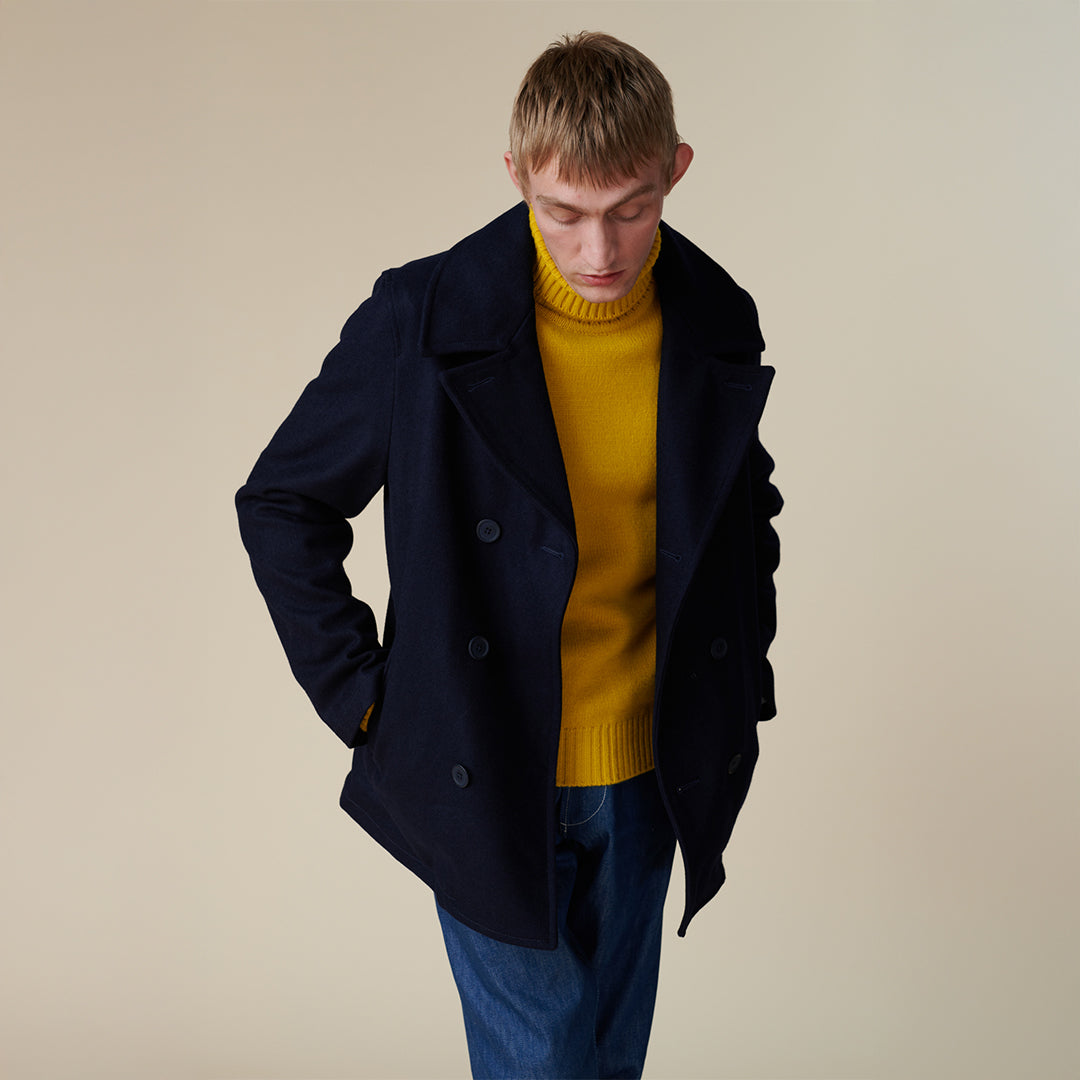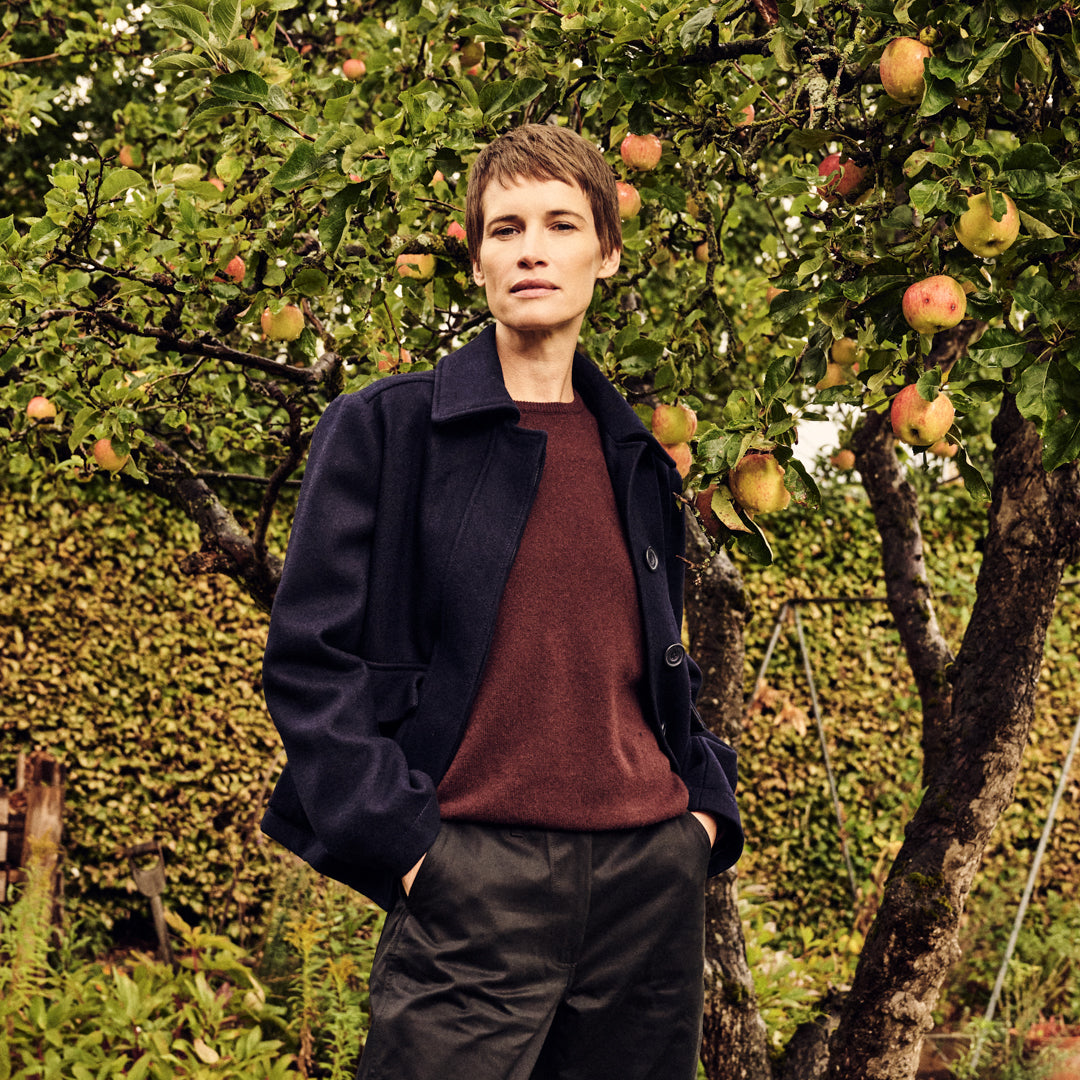Jeans that create jobs in Lancashire, jumpers that create jobs in Scotland, coats that create jobs in Yorkshire, socks that create jobs in the Midlands, pants that create jobs in Wales. When you shop with usyou’re directly creating skilled jobs in regions of the UK with a proud tradition of making exceptional quality clothing, regions suffering high levels of social and economic deprivations, jobs where they’re needed most.
We track the hours of manufacturing work we create and the number of jobs we support. We map the locations of the factories we work with.
Today we work with 48 partner factories located predominantly in the North West, Yorkshire, the East Midlands southern and central Scotland and South Wales. Most are in areas of severe economic and social deprivation.
We work with factories and suppliers in:
Ayr, Birmingham, Blackburn, Blackpool, Bolton, Bradford, Burgess Hill, Burnley, Chorley, Colne, Denby Dale, Duckinfield, Elland, Harringay, Haslingdon, Hathern, Hawick, Kinross, Langholm, Leeds, Leicester, Liverpool, Liversedge, Long Eaton, Nelson, New Tredegar, Pudsey, Radcliffe, Rochdale, Saddleworth, Stewarton, Sutton in Ashfield, Todmorden.
And the list is growing all the time as we add new product to our range.
It’s our mission to directly create over 5,000 new permanent skilled jobs. But creating the jobs is only part of the battle. We also need to encourage the next generation of skilled craftspeople to fill these jobs. So we’re working to help rebuild networks in the textile towns in which we work, to engage with local communities, to encourage people of all ages to join an industry that has a tradition of excellence stretching back over 700 years. We are about creating opportunities for people of all ages living in these regions to build long-term, fulfilling careers, not just in manufacturing, but in all the other areas connected with our business.
We work with education charities such as The Prince’s Foundation, helping to deliver skills training and textiles education for both school students and adult learners. We’re involved with community projects Like Homegrown/Homespun, The Festival of Making and the British Textile Biennial. We work with local schools helping build connections between them and local textile and clothing manufacturers, facilitating work placements and open days. And we work with local colleges and universities, including Blackburn College, Burnley College, Manchester Metropolitan, Leeds Arts and UCLAN in Preston, giving opportunities for students in photography, design, marketing and textiles to work on real projects. In everything we do we think about building pathways into employment and helping to shape a brighter future for people of all ages living in our manufacturing regions.
Fashion has created two big problems.
For over a thousand years the textile industry provided lots of jobs and created economic prosperity in regions across the UK. Our textile regions were once amongst the most prosperous in the country. We made the best clothes and the best textiles in the world and this was a source of great pride for the people that made them and the industry bound communities together.
In the 1950’s we were a nation that made things. Over 8 million people were employed in manufacturing making exceptional goods that were revered around the world. At one point over 70% of all the world’s cotton textile were made here, clothing and textiles employed around 1.6 million people, over a million of these in Lancashire and Yorkshire alone. But in the past five decades we’ve lost over five million manufacturing jobs in this country, nearly a third of those in textiles. Today our textile industry employs fewer than 100,000 people. That’s over 1.5 million textile jobs that have disappeared, in some cases in towns where textile jobs accounted for half of all employment. Half of all jobs gone, to be replaced by what? Today the regions in which Community Clothing works are amongst the most economically and socially deprived regions in the UK.
Our everyday clothes used to be high quality, well made from materials that didn’t harm the planet, and they were mostly made right here. Then fast fashion came along and instead of owning a few well-made pieces of clothing they convinced us all to buy lots and lots of low quality clothes made out of the cheapest possible materials, mostly plastics likes polyester made from oil.
Today the fashion industry accounts for 10% of global greenhouses gases and 20% of global water pollution, it is responsible for environmental toxicity, human exploitation, biodiversity loss, microplastic pollution, deforestation, water consumption, and fossil fuel use on an unprecedented scale.
We solve the problem with fashion in a simple way. We don’t do it.
We’re called Community Clothing for a reason. We make clothing, and clothing is very different to fashion.
Clothing is made well, made with care. It has lasting value, it gets better with age, it is honest and has purpose.
You used to be able to get great quality everyday clothes on any British High St but today it’s all fashion. Fashion is cheap and we’re all used to paying low prices for low quality. So our big challenge was how to make good quality clothing, here in the UK, and make it affordable to people on an average income?
We solved this by coming up with a radically different business model, one which cuts out all the usual costs of making and selling clothes. As a result our prices are about a third of most other brands for the same level of quality. And our clothes should last at least twice as long as most cheaper alternatives, and make you feel good wearing them.
We’ve made high quality, sustainably, ethically made clothes an affordable choice. So now you can play your part in creating great local jobs in local communities, whilst being kind to the planet.
It’s not just about jobs and the hard economic numbers. Great businesses can be a huge force for good in less easily quantifiable ways.
A thriving local industry helps to bring back a sense of optimism, giving people of all ages a sense that that they can find rewarding fulfilling careers wherever they happen to grow up. About allowing people to live and work within communities they’ve grown up in and feel strong connections with.
We work with lots of local projects and events aimed at building this feel-good factor. Our founder Patrick Grant is an ambassador for The Princes Foundation, the Festival of Making and the British Textile Biennial, which help revive skills and bring culture, economic opportunity and fun to people of all ages.
We work with schools, colleges and education charities working with people of all ages creating pathways into skilled employment. Our factories are helping to rebuild their local communities not just through the work and wages they provide, but through the many ways they engage with and give back to local projects clubs and societies.
We’re aiming to make good things happen for the communities we work with in as many different ways as possible.
When you shop with us over 90% of your money stays here in the UK economy supporting good jobs in hard working communities.
With lots of fashion brands only a small percentage of the money you spend stays local. With Community Clothing it’s over 90%. And what’s more most of that money is going to the people who make it.
With most other clothing brands just 20% to 25% of the money you spend goes to the manufacturers, and of that only a small percentage goes to the workers. At CC around 65% of the price you pay goes to the manufacturers, all right here in the UK, and of that over well over half goes to staff. You can read more about the detail of our economic model in the sections below.
Everyone involved with making our clothes is paid at least the national living wage. Some High St and Fast Fashion brands pay their workers as little as 10p per hour (that’s over 100 times less!)
In all around half of the money you spend is going directly as wages here in the UK, most in regions of very high social and economic deprivation. And even better than that those wages are then spent locally creating more economic value and this is a great big win for communities right across the UK.
When you shop with Community Clothing your money stays in the local economy (think where your money goes when you shop with other brands), and this money, gets spent locally creating yet more value in the local economy in a virtuous cycle. This means that every £1 you spend with us can create almost £3 of local economic value.
Our impact is multiplied through a well understood Local Economic Multiplier Effect
The local multiplier creates impact works like this.
Our local suppliers tend to spend their money locally in the day-to-day operation of their businesses, they’ll buy materials from local suppliers, use local services like landscapers or recycling services, they tend to buy equipment from local suppliers, and of course there are employee salaries most of whom live locally.
And then in turn all of those local businesses who supply to them spend their income locally, recirculating the money.
And those local employees, and the business owners who are often local too, spend their income in the local economy too.
All of this adds up to around a three times multiplication of the original economic value locally. This makes a huge difference to struggling local economies.

